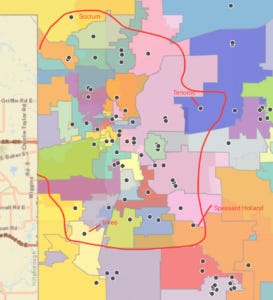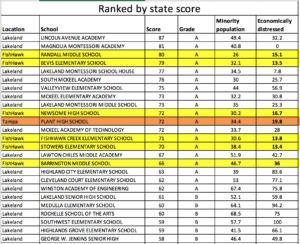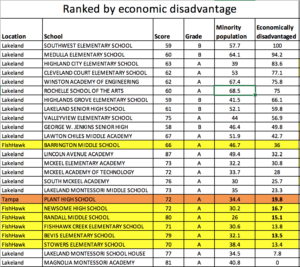I choose Lakeland (and its American schools) over Fishhawk (and its Fishhawk schools)
Fishhawk Ranch is a very wealthy, very white unincorporated enclave of Hillsborough County. Along with parts of South Tampa, Fishhawk is likely the wealthiest, whitest community in Hillsborough County. It has six zoned public schools -- three elementary schools, two middle schools, and one high school. According to Florida's DoE, Fishhawk's least white elementary school is 62 percent white. The other two push 70. Fishhawk's poorest elementary school has a 13.8 percent economically distressed enrollment.
Fishhawk's one high school is 70 percent white and 17 percent economically distressed. That one high school number is probably the best indicator of Fishhawk's overall demographics.

The Fishhawk developer markets Fishhawk schools as "the best schools in Hillsbourough County." And each scores highly on the state's fraudulent school grade scoreboard. At 79 points, Fishhawk's Bevis Elementary is the highest scoring elementary school in Hillsborough County, of any kind -- charter, magnet, anything.
Wouldn't be the "best" in Lakeland
But it would not be the "best" in Lakeland. Not even close. I'll bet you didn't know that Hillsborough-County-leading Bevis is 8 points behind Lakeland's Lincoln Academy magnet, which clocks in at 87. Lincoln has a 50 percent white and 32 percent "economically distressed" population.
And Valleyview Elementary, a straight-up zoned school in South Lakeland, which also serves Lakeland city kids, scores higher than the other two Fishhawk elementaries with a 77. Valleyview is 56 percent white and 56 percent economically disadvantaged.
In fact, the state scoreboard data I have analyzed says something pretty clearly: anyone who chooses to live in Fishhawk rather than Lakeland because of the schools is a fool.
And that's not meant as an insult to Fishhawk schools. I'm sure they carry out their missions competently and lovingly. It's just a dumb choice to force on yourself, if you care about the state's scoreboard data. You'll be fine in either place, except that this is Florida; and you always have to suffer that.
Helping the LEDC compete with Fishhawk
So what's the point of this? What are you doing, Billy? Why should anyone care about this demeaning comparison based on a fraudulent school grade scoreboard you despise?
It grows out of discussions with economic developers and my last article about Kate Wallace and Lakeland Leads and the Lakeland education report that's coming out. I want to help inform them, so that their work is as helpful and accurate as it can be. I guess you could consider this part of my outreach efforts. So I hope you'll bear with me.
If you've spent any time talking to the Lakeland Economic Development Council over the years, you've probably heard or seen a presentation that says some version of this: "High-powered professionals decide to choose FishHawk over Lakeland because our schools aren't good here."
I have certainly heard this myself from the LEDC.
It is Fishhawk, specifically, that gets cited. And yes, that's sort of an odd comparison. Lakeland is a city of almost 110,000 people, with a metro area pushing 300,000. Here's a map of what I consider the Lakeland-area schools. I count 55 public schools. But there are so many that it's hard to count. I could be off by a few.

By contrast, Fishhawk is an enclave of mostly wealthy white people that has six schools. Comparing Lakeland to FishHawk is more like comparing Lakeland to Christina, one of our own area neighborhoods/enclaves, than to a competing city or town. But if high-powered people are saying they choose Fishhawk over Lakeland because of the schools, I thought I should take a look at what the data actually says about that choice.
"Perpetual bottom-feeder?" I wouldn't say that.
I was also motivated to do this research by something Kate Wallace told the state Board of Education during its July meeting in Lakeland:
"I think a dark spot for our community has been being a perpetual bottom-feeder district academically."
Full video here of when Kate and I spoke back-to-back at the BoE meeting. I think its a useful juxtaposition.
As I understand it, Kate Wallace has never lived in Lakeland until she moved here a few months ago. She grew up in Bartow. Kate has spent most of her adult professional life as a lobbyist/advocate, including four or five years with Jeb Bush's foundations in Tallahassee. So I'm not entirely sure what she means by "our community." I guess she means Lakeland.
And "perpetual bottom feeder?"
I have never thought of myself or my children or their teachers that way. And my family has lived here 20 years and attended virtually every possible type of Lakeland public school. I'm a self-critical person; and it's possible that my family needs to ramp up the self-loathing a bit. But the fraudulent scoreboard, which Kate believes strongly in, disagrees with her. The scoreboard does not support her view of "bottom-feeder," especially compared to Fishhawk. And I hope my research can inform the research and report that Kate and Lakeland Leads are about to publish.
So let's take a look together; because I have good news for Lakelanders worried about how we stack up with Fishhawk's "best schools in Hillsborough County."
Punching above our weight
There are 18 Lakeland-area public schools that are As or high Bs on the fraudulent state scoreboard. I've added in the six Fishhawk schools (in yellow), and just for the hell of it, Plant High School (in orange), which is the quintessential elite South Tampa public high school.
I have sorted these schools three different ways in three different images below: 1) School grade point score. 2) Economic disadvantage 3) Non-white enrollment.
What leaps out at me first is that the Fishhawk schools and Plant cluster together at the bottom of the economic disadvantage and diversity table. They are not very diverse; and they are not very poor, or even "working class."
However, on the scoreboard ranking, the Fishhawk schools and Plant schools cluster in the middle. In a world of much-discussed racial and class "achievement gaps," this cluster alone tells me that Lakeland area schools punch well above their weight on the scoreboard.
Take a look for yourself.


[Note: economic disadvantage is tricky because of the way it's calculated in the era of "community eligibility" for free and reduced lunch. It's especially tricky because charters seem to account for these numbers in different and variable ways. I wrote a little about this in a previous piece. But these numbers are the official numbers reported to and published by the state. The only numbers that strike me as wrong are the two Montessori charter elementaries in Lakeland. Full disclosure: my son attended Lakeland Montessori K-6. I think both of those schools are more likely in the range of Fishhawk schools and Plant. I do not believe Magnolia Montessori has "zero" economic disadvantage. I think their extreme low numbers are a quirk of reporting.]

What this means for LEDC business recruitment conversations
In a previous article, I went through a fairly exhaustive comparison of Lakeland's charter and choice schools and made a number of observations. I also pointed out that the Lakeland area has nine of the top 10 highest scoring zoned schools in Polk County.
But what does any of that mean for our high-powered out-of-county professional business owner/professional chatting up local economic developers about schools? Let's think it through:
McKeel, Lincoln, and the wait-list issue
The Lakeland-area schools that most mimic the Fishhawk schools in enrollment diversity, economics, scale, and score are the McKeel system charter schools. There are two McKeel elementaries and a middle-high school. They are very white and very wealthy compared to the overall Lakeland area population. If attending a school that looks like a Fishhawk school is important to you, McKeel is your best bet. But there's a problem: as charter schools, the McKeel schools aren't zoned. You have no entitlement to attend. You have to apply and join an admission lottery/waiting list. You can move into Fishhawk Ranch by buying a house there. You can't do that for McKeel schools. Yet. I'll come back to that in a second.
If super high score is what matters most to you, Lincoln is clearly the choice.
It's "better" than any Fishhawk school, by a fairly wide margin. As a magnet school, it's more diverse than McKeel, with a 25 percent black student enrollment and roughly 50 percent overall non-white population. Again, the problem from a newcomer's point-of view is that it's not a zoned school. Except it kinda is now.
Creating zones for Lincoln and McKeel
The Polk School District, in collaboration with the City of Lakeland, has created a zone for Lincoln that includes the Lincoln Square Park housing development. If you live in that new development, next door to Lincoln, you are zoned for Lincoln. I'm proud to have championed this new policy, along with Board Member Kay Fields and Superintendent Byrd. And we are doing something similar with McKeel Academy of Technology charter. As part of an expansion of the existing McKeel 6-12 middle-high school, we're creating a zone around McKeel and giving preference to the kids who live within it.
The Lincoln and McKeel steps are small and not well known; but they're a start. Look for continued board-level emphasis on access. To its credit, the McKeel leadership says it wants to diversify; and we've developed a good working relationship to help make that happen. Within the realities of what Florida's choice laws create and allow, the district and McKeel aren't competing with each other anymore. We're looking for ways to collaborate. That's an important community benefit. (One day, we'll get there with Lake Wales, too.)
Neighborhoods sell neighborhoods
What does this mean for the LEDC, when it talks to that high-powered parent?
It means that moving into Lincoln or McKeel is either an option right now, or will be in the near future. However, there are no 3,000-square-foot McMansions to buy next to the McKeel or Lincoln campuses. Both schools sit in the middle of working class, predominantly black/non-white neighborhoods. I predict that exactly zero high-powered elite business professionals will choose to move next door to Lincoln or McKeel.
Our new efforts are designed to diversify those schools and to offer benefits to residents who already live in those neighborhoods. And without hesitation or apology, I will say publicly that I care much much more about the well-being of my fellow Lakelanders than I do about some hypothetical out-of-town rich executive, who probably is skeptical of the concept of public school to begin with.
Indeed, I differ strongly with the conventional wisdom that schools sell neighborhoods. I have never seen any evidence that schools actually sell neighborhoods. I have seen lots of evidence that neighborhoods sell neighborhoods. At a certain baseline of neighborhood demographics, schools can be a tie-breaker. But they are a tie-breaker, not the driver. I think people say otherwise as cover for more base instincts and fears.
Valleyview is "better" than 2 out of 3 of Fishhawk elementaries. You can move right in.
Moreover, LEDC can tell that high-powered out-of-town executive that Valleyview Elementary, which is "better" on the scoreboard than 66 percent of the "best schools in Hillsborough County," is open for their business. Just buy a house in the two-fold Valleyview zone. It includes wealthy South Lakeland suburbs and the area north of Parker Street and roughly centered on Bryant Stadium in central Lakeland. I bet this high-powered executive could a great deal on a house in the central Lakeland area. I also bet there is no chance that executive will do that in order to access such a high quality, "better"-than-Fishhawk, school.
Indeed, there are plenty of Lakeland-area "A" and high "B" schools you could also move directly into, if the grade is what matters to you. Cleveland Court, for instance, is a few points below the Fishhawk schools, but it's still an "A" and way more diverse. You also get to live in the Dixieland/Lake Hollingsworth area, which is way cooler in my view than Fishhawk and also full of wealthy-ish people.
Let's make geographic proximity a choice factor
And for good measure, here's an idea that I think the LEDC could get behind. I'd like to make geographic proximity a choice factor -- just like charter, magnet, academy, and audition are today.
In Florida, where government only pretends to care about parental choice so it can grift taxpayers, you still don't have the right or choice to attend the school closest to you. No matter who you are. I'd like to change that.
To spell out: at the same time that you would apply for a special magnet program or academy or charter, you could also apply to attend the school physically closest to you. In many (if not most) cases, our zoned schools are not the closest schools to the children zoned for them. And that lands kids on very long and difficult bus rides. This could begin to change it in a measured way that would not cause immediate chaos. I would include our magnet schools in "closest school" status; and I would invite charter schools to participate. It would be interesting to see which schools would. More on that to come. But I would think LEDC and Lakeland Leads might find that intriguing and helpful to recruitment.
Where the scoreboard says to focus resources and energy and pressure
Again, in reviewing these scoreboard numbers, we're comparing the 55ish public schools of a diverse urban metro area (many of which are self-selected enrollments) to the six zoned schools of a wealthy white exurban enclave. It's important to remember that. This entire exercise is probably invalid statistically. But people often vote with their feet for logically invalid reasons.
And here are some areas for focus or improvement, based on the scoreboard.
The middle school self-selection divide
And in my reading of the scoreboard, Fishhawk's most impressive school is actually its lowest-scoring: Barrington Middle School, which is a 66A. It's also, by far, the least wealthy and homogenous Fishhawk school, at 47 percent non-white enrollment and 38 percent economic disadvantage. That much whiteness and wealth would stand out in a Polk district school. But in Fishhawk, Barrington is an outlier in the other direction. It's a Fishhawk paragon of diversity, probably because of some busing.
Lakeland has four self-selected middle schools that are either As or high B -- Lakeland Montessori Middle charter (73A), McKeel Academy of Technology charter (72A), the district's Lawton Chiles magnet (67A), and the district's Rochelle School of the Arts (60B). I want to take a second to call out Rochelle. It has a 68 percent non-white enrollment. It is 50 percent black. Again, in an era where the so-called racial and class "achievement gap" is a constant mantra, I don't know of any school, anywhere, more impressive than Rochelle on the scoreboard. I also think your high-powered executive is likely to get into one of those four schools if they try.
In zoned middle schools, the Lakeland area does not have any middle school that scores as high as Fishhawk's Barrington. Our highest scoring zoned middle school is Lakeland Highlands at 56B. It's about the same non-white population as Barrington; but it's a lot poorer. I think this disparity shows that middle schools most reveal how Lakeland's self-selected enrollment layer of charter and magnet schools can shape scoreboard performance. There are fewer middle schools with more kids, which means more ESE and behavioral issues get concentrated in zoned schools, among many other factors. It's a longstanding and difficult challenge, created largely by the community itself over many years.
I wold love to rain resources and support on all of our zoned middles. The self-selected middles are doing fine on the scoreboard.
Tenoroc High
And if there is any school in the entire Lakeland area with leadership that might justify Kate Wallace's perception, it's Tenoroc High School. As fraudulent as I consider the scoreboard in capturing individual educational experience, it can be useful in highlighting statistical outliers that merit deeper study.
Tenoroc is one example. It is the lowest scoring high school (37D) in Polk County by a wide margin -- 8 points. It is a very diverse school that serves working class kids. Its demographics look quite a bit like Kathleen High; but its scoreboard performance lags significantly. In fairness to Tenoroc, it doesn't have a specialized program at the scale of Kathleen's Central Florida Aerospace Academy to help the numbers.
But when one looks beyond the numbers, one sees that Tenoroc kids have lost access to high level math and science courses, as spelled out in the recent School Board roundtable on Math and Science education. One also sees a longstanding leadership crisis, which I have written about in great great depth. You can read about it here. Indeed, I consider Tenoroc High the the district's greatest single failure in living to up to our "Students First" motto.
I have worked very very hard to outline leadership deficiencies at Tenoroc in the hope of improving the experience for individual kids and faculty there. Unfortunately, I have failed to convince the district. No matter how much metal I grind trying to address that, nothing seems to happen. The Tenoroc principal appears to enjoy a remarkable level of protection -- for both personal behavior and academic outcomes -- that no one else in this district does. And I have absorbed some narrow, but pointed, community criticism for having the nerve to say publicly that the kids and faculty of Tenoroc deserve much better than they are getting.
If Lakeland High or Jenkins or Lake Gibson or Kathleen were in this position, I doubt the Lakeland community would stand for it for long. I doubt the LEDC would stand for it. But Tenoroc exists in a sort of unincorporated no-man's-land where Lakeland and Auburndale overlap. Maybe it's easy for Lakeland to write it off as not really a Lakeland school. But I know my son attended Crystal Lake Middle with a number of kids now attending Tenoroc. And I know the Lakeland Electric-sponsored power academy is housed at Tenoroc. That alone should make Lakeland sit up and take notice.
It is my hope that the Lakeland Leads report will be helpful to the kids of Tenoroc High. Because they deserve not to be written off. I certainly won't write them off. At same time, using Tenoroc High's scoreboard and real world troubles as a reason to move to Fishhawk, rather than Lakeland, would be a strange and self-defeating decision for a high-powered business executive when there are a host of other options available.
Lakeland schools look like the American future; Fishhawk schools look like Fishhawk
Let me conclude by saying this: I am, by any definition, a high-skill, high wage employee in my non-School Board life. I got into and performed well at an elite college -- if that counts for anything. But my best preparation for the workplace and life were the experiences I absorbed from the massively integrated (in race and wealth) classrooms and hallways and PE fields of Palatka, Florida.
Today, companies are crying out for "soft skills" in their employees. They're crying out for empathy and organizational savvy and good judgement from their employees. But empathy is a hard skill to teach; one tends to develop it through broad experience and imagination, qualities that are virtually impossible to test and capture on a scoreboard.
And when you look at this scoreboard nonsense, understand that it captures nothing of personal experience and empathy-building. As I wrote in a previous article, my son moved from self-selected, "A-rated" Lakeland Montessori Middle charter to what was then D-rated (now C) Crystal Lake Middle, a large zoned majority minority middle school for 8th grade. Here's what I said about that before:
When I say that my son’s experience, socially and academically, at D-rated Crystal Lake was just as good and perhaps better in multiple ways than at A-rated Lakeland Montessori, the school grade does not believe me.
Or more accurately, I think, it just doesn’t care.
I am not worthy of the state’s trust. It must punish my child’s school and teachers on my behalf. My own perceptions as a parent are irrelevant to the school grade’s numbers and purpose and vengeance. And if it doesn’t care about me or my judgments — white male, high skill, high wage knowledge worker in one life and elected official in the other — who does it care about?
The school grade system believed me a good parent when my son was in an A-rated charter or magnet schools. As I’ve said many times, that changed when we chose to go to a D-rated middle school...
...All the Florida Model minions immediately assumed I was trapped and helpless and without agency or reason. They say it all the time. Listen to them. The Board of Education made it very clear to me when I tried to talk to it in 2016.
As I was writing this, one of our finest principals, at a highly diverse school, shared this article with me about the "browning of America." Here's a really fascinating paragraph Florida's overall enrollment demographics:
The Florida Department of Education has more current numbers for 2018-19, showing that the white student population dipped to 37.4 percent. Hispanic students made up 33.9 percent of statewide enrollment that school year, and black students made up 21.9 percent.
That's all the Florida's counties added together; but it is for all practical purposes identical to Polk County's public school enrollment numbers. In fact, I would bet that Polk County is Florida's median county for enrollment demographics. Just by enrolling in our schools, you're participating in a mix of people that looks like the future of America -- both in your neighborhoods and in your workplace.
As a high skill, high wage worker in the knowledge economy, I want my kids to have the same opportunities to succeed that I've enjoyed. Comfort, ease, and effectiveness with navigating the demographic changes that are occurring in America is a pre-requisite for a happy, successful business and personal life, in my opinion.
The Florida scoreboard won't capture any of that. But I know my son is getting it. And I don't think he would at Fishhawk, which exists to provide relative homogeneity to its residents. It exists to escape the rest of America.
Enrolling in a Fishhawk school exposes you to a ton of people just like you, in demographic terms. I respect that a lot of people, of all races and classes, make that choice. I don't attack other people's choices. But I do think Lakeland schools prepare my kids better to thrive and compete in an America that looks much more like Lakeland and Polk County than it does Fishhawk. Fishhawk just looks like Fishhawk.
Moreover, the scoreboard shows that a high-powered executive is likely to sacrifice nothing or almost nothing on the scoreboard to gain those 21st century American workplace skills in Lakeland. If we, as a Lakeland community, school district, and economic development force can't tell that story with pride, we're not trying hard enough. If we look at that as "bottom-feeder," we just haven't done the work.
And I hope the next time the LEDC has the Fishhawk discussion with someone that they'll call me. I can help. And I'm eager to do so.


